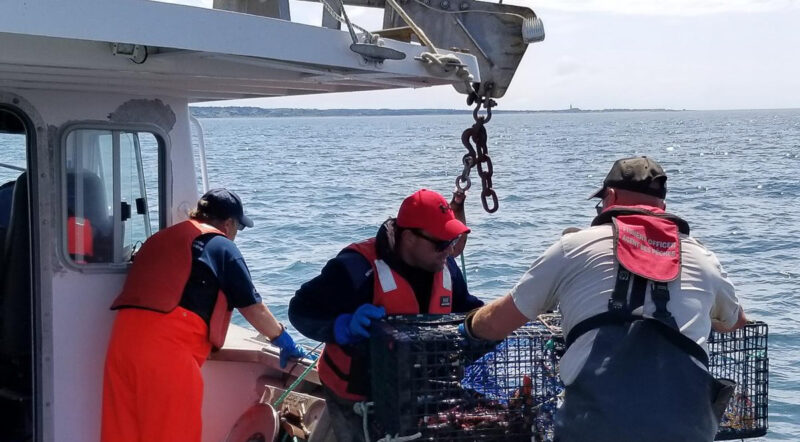Lack of clarity creates chaos in Canada’s coastal communities
A lack of clarity on the governance of our oceans puts at risk Canada’s lofty ideal to lead the Blue Revolution for coastal communities
Commentary
By Fabian Dawson
SeaWestNews
Canada’s lofty ideals to lead the global Blue Revolution for a shared prosperity in coastal communities, needs a lot more clarity.
The current fog of confusion over fishing rights and aquaculture has fueled violence, bullying, and a rapid decline in institutional trust, primarily because our politicians are shying away from providing clear answers and policy pathways.
First of all, let’s be clear that there is no place for violence over who gets to harvest the bounty of our oceans, as is happening against indigenous Mi’kmaq fishers in southwestern Nova Scotia.
The violence is disgusting and racist as the Mi’kmaq lobster fishers have a constitutionally protected right, outlined in the Supreme Court’s 1999 Marshall Decision, to catch and sell lobsters, even though the commercial lobster season is currently closed.
The fundamental issue here is that no one from the top bench to politicians to the Mi’kmaq and commercial fishers have a definition for the indigenous right to fish to sustain a “moderate livelihood”.
Nova Scotia Premier Stephen McNeil is now urging Ottawa to define what constitutes legal harvesting in a “moderate livelihood” fishery.
Let’s hope he gets some answers quickly.
Over on the West Coast, a similar lack of clarity by both federal and provincial politicians over the issue of salmon farms, has led to bullying and harassment of workers in the aquaculture industry.
Here it is fueled by the rhetoric of the loud anti-fish farm activists, who have refused to believe any science that is contrary to their stance that fish farms are responsible for the decline of wild stocks in British Columbia.
Despite voluminous evidence by local, national and international scientists, including nine recent peer reviewed studies by that Canadian Science Advisory Secretariat (CSAS), that salmon farms pose a minimal risk to wild stocks, the activists want them ousted from the seas and to grow fish on land.
This activist-agenda hides the fact that growing fish on land will increase greenhouse gas emissions, drive the industry away from remote coastal communities to bigger markets in the US and put enormous pressure on land and freshwater resources.
The technology to grow salmon in land-based tanks to market size is also unproven. Perhaps that is why there is no major investment in BC that backs the vision of the activists. Instead we have seen dozens of such land-based fish farms go out of business.
The provincial NDP party, that is poised for a second term as government, has vowed that its decisions on aquaculture will be driven by science and the United Nations Declaration on the Rights of Indigenous Peoples or UNDRIP, which it has adopted.
Problem is that they have no grip on UNDRIP when it comes to natural resources and have leaned towards the quackery of the activists, that emanates mainly from voter-rich urban areas at the expense of the First Nations and coastal communities on Vancouver Island that depend on aquaculture and logging.
With 20 First Nation agreements to operate in traditional territories, BC salmon farmers support close to 7,000 jobs and generate $89 million in annual federal, provincial, and municipal taxes.
Salmon farming in Vancouver’s North Island supports 1,786 direct jobs, providing $460 million in economic output while generating business for 823 local vendors.
The salmon farmers have also announced plans to immediately invest $113 million in aquaculture projects and generate nearly 450 new well-paid jobs, to help North Vancouver Island in its post COVID-19 recovery efforts. Translated that is $5.8 million in near-term annual tax revenue.
So far the NDP’s response as to what it will do to support the sustainable growth of aquaculture in BC has been anemic.
The party says it is supportive of the aquaculture industry as long as the farmers get First Nations consent to operate in their traditional territories, and if science shows that fish farms pose no more than a minimal risk to wild stocks.
The latter is clear and proven.
The former needs clarity as to what constitutes consent.
Canada, especially in the wake of these polarizing divisions on both coasts, needs strident clarity on the governance of our oceans to ensure a shared prosperity that is driven by science and knowledge not anxiety and speculation that leads to violence.
Otherwise our Blue Revolution for a sustainable ocean economy will be dead even before it starts.
(Image courtesy of DFO shows inspections of lobster traps in the waters off Nova Scotia)

